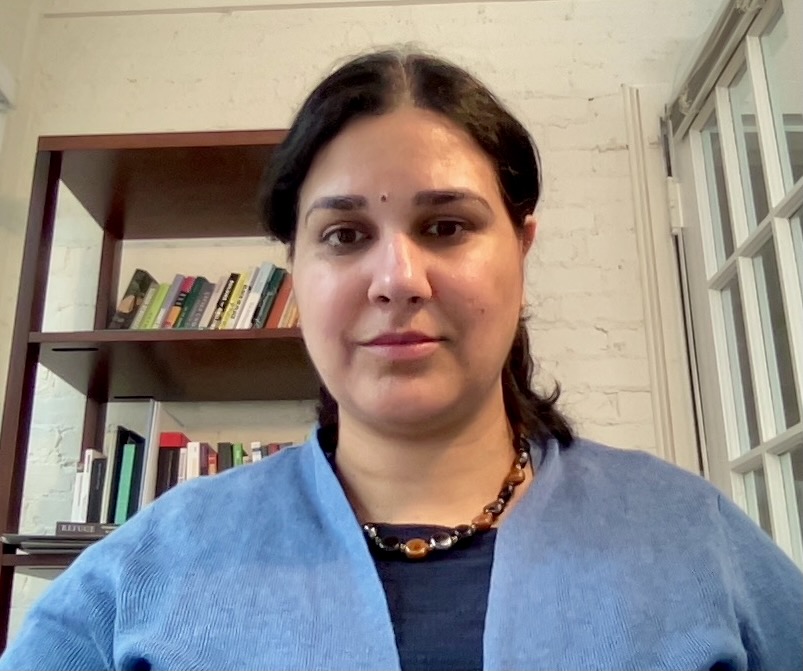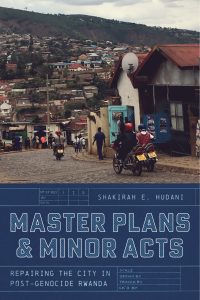
Bookmark This is a feature that highlights new books by College of Arts and Sciences faculty and alumni, published each month. The March featured book is Master Plans and Minor Acts: Repairing the City in Post-Genocide Rwanda (The University of Chicago Press, April 2024) by Shakirah Hudani.
 Q: Can you give us a brief synopsis of your book?
Q: Can you give us a brief synopsis of your book?
A: Master Plans and Minor Acts focuses on urban transformation in post-genocide Rwanda in the context of its post-conflict transition, set after the 1994 genocide of the Tutsi and the civil war in which this genocide was situated. I ask how and to what extent repair might be undertaken through the “right to the post-conflict city,” particularly in a region with a pronounced rural-urban divide and iterative conflict over time. I focus on repair in both the material sense, such as repairing a broken house or a roof, and in the social sense, thinking through social conciliation after large-scale violence.
Starting in the core of the capital Kigali’s old neighborhoods and moving outward to its rural areas, I focus on the stakes of access to urban space as a politicized milieu in a post-conflict country. I also ask what the limits are to the project of repair, given multiple forms of social memory and various local ideas of place and belonging. These local attachments to place so necessary to the project of repair are rapidly being erased and written over through large-scale spatial planning projects.
Q: How does this fit in with your research interests and passions?
A: My interests center on post-conflict contexts and African urbanism, focusing on East and Central Africa, but also on rebuilding urban space after conflict comparatively in other regions, such as in post-genocide Cambodia. Similar groups of planning consultants and financiers work in multiple post-conflict contexts in Africa and Asia. I am interested in seeing what forms of social memory are erased or covered up over time in post-conflict societies, and what this means for the forms of memory that become dominantly articulated through the state and its use of built space.
 Q: What was the original idea that made you think: “There’s a book here?”
Q: What was the original idea that made you think: “There’s a book here?”
A: It was a process that evolved over time. The resonance of concepts such as “repair” emerged from engaging with my field notes: I remember looking back through notes on testimony from gacaca transitional justice courts in the early 2000s and seeing questions of material repair emerge, as individuals argued over appropriate forms of material restitution and social conciliation. My more recent research focused on homes, neighborhoods and the planning of built space, such as with long term residents of old Kigali trying to preserve their place in the city and survive master planned reconstruction.
Q: What surprised you when researching/writing this book?
A: I first conducted work on Rwanda’s transitional justice process between 2002-2004, and later returned for urban-focused research from 2017 onward. I was struck by what had changed: although urban areas were much more developed, there was a constriction of acceptable forms of memory, access to space and social discourse. There was much more openness in the early 2000s compared to tightly regulated space and the state-controlled narrative present today. This was surprising to me, and I realize that I would not have the same perspectives on complex memory and social change today if my prior period of research had not taken place.
Q: Where’s your go-to writing spot, and how do you deal with writer’s block?
A: I wrote various parts of this book in East Africa, often in various cafes and study spots, and it helped me to be proximate to my field sites. I also benefited from writing time through a faculty fellowship at the Institute for the Arts and Humanities at UNC. To alleviate writer’s block, I often listened to music from Rwanda and Congo! Finally, it helped me to read over my field notes over time and remember why I was writing this book and what I wanted to convey or call into question.
Shakirah Hudani is assistant professor in the department of African, African American and diaspora studies and adjunct assistant professor in the department of city and regional planning. Her teaching and research interests focus on African cities, post-conflict urbanism, transitional justice, Rwanda and the Great Lakes region, Kenya and East Africa.
Garth A. Myers of Trinity College writes: “Contemporary Kigali and Rwanda are often presented as gleaming models for a fantastic new urban Africa. [Hudani’s] book provides a rigorous, well-researched and cautious set of caveats to the mythmaking, leaving the reader with a nuanced understanding of urban development in post-genocide Rwanda …”
Nominate a book we should feature by emailing college-news@unc.edu. Looking for more faculty and alumni books to add to your reading list? Check out our fall ’23 College magazine books list.
